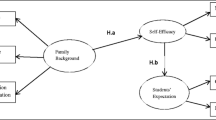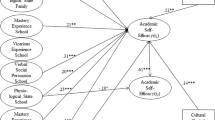Abstract
Research indicates both family background and self-efficacy influence academic outcomes; however, family background also impacts self-efficacy development. The purpose of the current study was to establish whether self-efficacy mediates the relationship between family background and academic achievement. Results indicated family background features were not robust predictors of academic achievement in the current sample, which limited testable mediation pathways. Evidence was found that self-efficacy does mediate the relationship between parental involvement and expectations of academic success. Results also indicated self-efficacy is a strong and consistent predictor of grade point average and expectations of academic success. Based on these findings, it is recommended educators utilize previously developed classroom strategies which have been shown to enhance students’ self-efficacy levels.
Similar content being viewed by others
References
Amato P. R. (2001) Children of divorce in the 1990s: an update of the Amato and Keith (1991) meta-analysis. Journal of Family Psychology 15(3): 355–370
Amato P. R., Keith B. (1991) Parental divorce and adult well-being: A meta-analysis. Journal of Marriage and the Family 53(1): 43–58
Astone N. M., McLanahan S. S. (1991) Family structure, parental practices and high school completion. American Sociological Review 56(3): 309–320
Bank B. J., Slavings R. L., Biddle B. J. (1990) Effects of peer, faculty, and parental influences on students’ persistence. Sociology of Education 63: 208–225
Bandura A. (1977) Self-efficacy. Toward a unifying theory of behavioral change. Psychological Review 8(2): 191–215
Bandura A. (1989) Regulations of cognitive processes through perceived self-efficacy. Developmental Psychology 25: 729–735
Bandura A. (1993) Perceived self-efficacy in cognitive development and functioning. Educational Psychologist 28(2): 117–148
Baron R., Kenny D. (1986) The moderator-mediator variable distinction in social psychological research: Conceptual, strategic, and statistical considerations. Journal of Personality and Social Psychology 51(6): 1173–1182
Berry J. M., West R. L. (1993) Cognitive self-efficacy in relation to personal mastery and goal setting across the life span. International Journal of Behavioral Development 16(2): 351–379
Bong M., Skaalvik E. M. (2003) Academic self-concept and self-efficacy: How different are they really. Educational Psychology Review 15: 1–40
Catsambis S. (2002) Expanding knowledge of parental involvement in children’s secondary education: Connections with high school seniors’ academic success. Social Psychology of Education 5: 149–177
Cheung S. Y., Andersen R. (2003) Time to read: Family resources and educational outcomes in Britain. Journal of Comparative Family Studies 34(3): 413–434
Choi N. (2005) Self-efficacy and self-concept as predictors of college students’ academic performance. Psychology in the Schools 42: 197–205
Choi N. (2003) Further examination of the self-efficacy scale. Psychological Reports 92: 473–480
Coleman P. K., Karraker K. H. (1997) Self-efficacy and parenting quality: Findings and future applications. Developmental Review 18: 47–85
Crouter A. C., MacDeermid S. M., McHale S. M., Perry-Jenkins M. (1990) Parental monitoring and perceptions of children’s school performance and conduct in dual- and single-earner families. Developmental Psychology 26(4): 649–657
Cutrona C. E., Cole V., Colangelo N., Assouline S. G., Russell D. W. (1994) Perceived parental social support and academic achievement: An attachment theory perspective. Journal of Personality and Social Psychology 66(2): 369–378
De Graaf P. M. (1986) The impact of financial and cultural resources on educational attainment in the Netherlands. Sociology of Education 59: 237–246
Dornbusch S. M., Ritter P. L., Leiderman P. H., Roberts D. F., Fraleigh M. J. (1987) The relation of parenting style to adolescent school performance. Child Development 58: 1244–1257
Eccles-Parsons J., Adler T., Kaczala C. M. (1982) Socialization of achievement attitudes and beliefs: Parental influences. Child Development 53: 310–321
Fan X., Chen M. (2001) Parental involvement and students’ academic achievement: A meta-analysis. Educational Psychology 13(1): 1–22
Fass M. E., Tubman J. G. (2002) The influence of parental and peer attachment on college students’ academic achievement. Psychology in the Schools 39(5): 561–573
Gecas V. (1989) The social psychology of self-efficacy. Annual Review of Sociology 15: 291–316
Gecas V., Schwalbe M. L. (1983) Beyond the looking-glass self: Social structure and efficacy-based self-esteem. Social Psychology Quarterly 46(2): 77–88
Ginsburg G. S., Bronstein P. (1993) Family factors related to children’s intrinsic/extrinsic motivational orientation and academic performance. Child Development 64: 1461–1474
Gottfried A. W., Gottfried A. E., Bathurst K., Guerin D. W., Parramore M. M. (2003) Socioeconomic status in children’s development and family environment: Infancy through adolescence. In: Bornstein M., Bradley R. (eds) Socioeconomic status, parenting, and child development. Lawrence Erlbaum Associates, Mahwah, NJ, pp 189–207
Grolnick W., Ryan R. (1989) Parent styles associated with children’s self-regulation and competence in school. Journal of Educational Psychology 81(2): 143–154
Ho E. S., Williams J. D. (1996) Effects of parental involvement on eighth-grade achievement. Sociology of Education 69: 126–141
Hoskovcova S. H. (2006) Self-efficacy in preschool children. Studia Psychologia 48(2): 175–182
Jackson D. W., Tein J. (1998) Adolescents’ conceptualization of adult roles: Relationships with age, gender, work goal, and maternal employment. Sex Roles 38: 987–1008
Jacobs N., Harvey D. (2005) Do parents make a difference to children’s academic achievement? Differences between parents of higher and lower achieving students. Educational Studies 31(4): 431–448
Kalter N., Alpern D., Spence R., Plunkett J. W. (1984) Locus of control in children of divorce. Journal of Personality Assessment 48: 410–414
Keith T. Z., Keith P. B., Troutman G. C., Bickley P. G. (1993) Does parental involvement affect eighth-grade student achievement? Structural analysis of a national data. School Psychology Review 22(3): 474–496
Kenny M. E. (1987) The extent and function of parental attachment among first-year college students. Journal of Youth and Adolescence 16: 17–29
Kurtz L., Derevensky J. L. (1993) The effects of divorce on perceived self-efficacy and behavioral control in elementary school children. Journal of Divorce and Remarriage 20(3/4): 75–94
Lent R. W., Brown S. D., Larkin K. C. (1984) Relation of self-efficacy expectations to academic achievement and persistence. Journal of Counseling Psychology 31(3): 356–362
Leung J. J., Wright B. W., Foster S. F. (1987) Perceived parental influence and adolescent post-secondary career plans. The High School Journal 70(4): 173–179
Lin C. H. (2003) Intergenerational parallelism of self-efficacy: Moderating variables, mediating variables, and common antecedents. Dissertation Abstracts International 65(7-A): 2783 (Doctoral dissertation, Texas A & M University, 2003)
Locke E. A., Frederick E., Lee C., Babko P. (1984) Effect of self-efficacy, goals, and task strategies on task performance. Journal of Applied Psychology 2: 241–251
Long N., Forehand R., Fauber R., Brody G. H. (1987) Self-perceived and independently observed competence of young adolescents as a function of parental marital conflict and recent divorce. Journal of Abnormal Child Psychology 13(1): 15–27
Marsh H. W., Roche L. A., Pajares F., Miller D. (1997) Item-specific efficacy judgments in mathematical problem solving: The downside of standing too close to trees in a forest. Contemporary Educational Psychology 22: 363–377
Matsen A. S., Hubbard J. J., Gest S. D., Tellegen A., Garmmezy N., Ramirez M. (1999) Competence in the contexts of adversity: Pathways to resilience and maladaptation from childhood to late adolescence. Development and Psychopathology 11: 143–169
Milne A. M., Myers D. E., Rosenthal A. S., Ginsburg A. (1986) Single parents, working mothers, and the educational achievement of school children. Sociology of Education 59: 125–139
Mji A., Mbinda Z. (2005) Exploring high school science students’ perceptions of parental involvement in their education. Psychological Reports 97: 325–336
Mone M. A. (1994) Comparative validity of two measures of self-efficacy in predicting academic goals and performance. Educational and Psychological Measurement 54: 516–529
Moss E., St-Laurent D. (2001) Attachment at school age and academic performance. Developmental Psychology 37(6): 863–874
Multon K. D., Brown S. D., Lent R. W. (1991) Relation of self-efficacy beliefs to academic outcomes: A meta-analytic investigation. Journal of Counseling Psychology 38(1): 30–38
Naevdal F., Thuen F. (2004) Residence arrangements and well-being: A study of Norwegian adolescents. Scandinavian Journal of Psychology 45: 363–371
Schneewind K. A. (1995) Impact of family processes on control beliefs. In: Bandura A. (eds) Self-efficacy in changing societies. Cambridge University Press, Cambridge, UK, pp 114–148
Schunk D. H. (2001) Self-efficacy and achievement behaviors. Educational Psychology Review 1(3): 173–208
Schunk D. H. (1991) Self-efficacy and academic motivation. Educational Psychologist 26(3/4): 207–231
Schunk D. H. (1981) Modeling and attributional feedback effects on children’s achievement: A self-efficacy analysis. Journal of Educational Psychology 74: 93–105
Shell D. F., Murphy C. C., Bruning R. H. (1989) Self-efficacy and outcome expectancy mechanisms in reading and writing achievement. Journal of Educational Psychology 81(1): 91–100
Sherer M. (1990) General self-efficacy: More development needed. Psychological Reports 66: 1242
Sherer M., Maddux J. E., Mercandante B., Prentice-Dunn S., Jacobs B., Rogers R. W. (1982) The self-efficacy scale: Construction and validation. Psychological Reports 51: 663–671
Spivak K. M. (1994) Attachment and self-efficacy at four stages of life. (Doctoral dissertation, Pacific Graduate School of Psychology, 1994). Dissertation Abstracts International 56(1-B): 537
Teachman J. D. (1987) Family background, educational resources, and educational attainment. American Sociological Review 52: 548–557
Wardle J., Robb K., Johnson F. (2002) Assessing socioeconomic status in adolescents: The validity of a home affluence scale. Journal of Epidemical Community Health 56: 595–599
Whitbeck L. B. (1987) Modeling efficacy: The effect of perceived parental efficacy on the self-efficacy of early adolescents. Journal of Early Adolescence 7(2): 165–177
Wolters C. A., Pintrich P. R. (1998) Contextual difference in student motivation and self-regulated learning in mathematics, English, and social studies classrooms. Instructional Science 26: 27–47
Wood R. E., Locke E. A. (1987) The relation of self-efficacy and grade goals to academic performance. Educational and Psychological Measurement 47: 1013–1024
Woodruff S. L., Cashman J. F. (1993) Task, domain, and general efficacy: A reexamination of the self-efficacy scale. Psychological Reports 72: 423–432
Zimmerman B. J. (1995) Self-efficacy and educational development. In: Bandura A. Self-efficacy in changing societies. Cambridge University Press, Cambridge, UK, pp 202–231
Author information
Authors and Affiliations
Corresponding author
Rights and permissions
About this article
Cite this article
Weiser, D.A., Riggio, H.R. Family background and academic achievement: does self-efficacy mediate outcomes?. Soc Psychol Educ 13, 367–383 (2010). https://doi.org/10.1007/s11218-010-9115-1
Received:
Accepted:
Published:
Issue Date:
DOI: https://doi.org/10.1007/s11218-010-9115-1




